Does the Battle of the Sexes Begin in the Womb?

With the discovery of the double helix, science began to unravel an essential mystery of life. The revelation placed researchers on the threshold of a frontier as tantalizing as the farthest reaches of space. The human race had embarked upon an exploration of itself.
Before DNA testing, there was no way to know, absolutely, the paternity of a child. Maternity, on the other hand, was never in doubt.
How could the father, biologically, compensate for his uncertainty? How could he insure that his offspring made it to maturity, no matter who was carrying the fetus? One way seems to be for him to manage the growth rate of the fetus (or at least to try to do that).
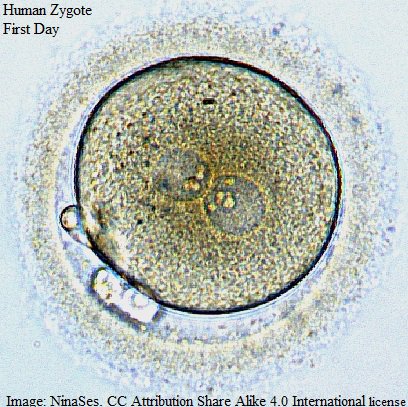
<<<The picture shows a human zygote, in the very first stages of fetal development. The sperm has penetrated the egg. What are the instructions for the developing embryo? What part of those instructions come from the mother, and what part from the father? Researchers are still learning answers to those questions.
But how can the father reach into the womb and control (try to control) the growth of the fetus? Does the mother accept this control? And if she doesn't want to, how can she possibly resist?
The mother has a definite interest in this issue. She has to carry the fetus. All the resources the fetus uses will come from her. The mother has to worry about her own survival, and about the well-being of her future children. She wants a healthy fetus, not a greedy one. It will not suit her to have the instructions from the father for a robust, rapidly growing fetus to prevail. So what happens?
Gagging the Father

Essentially, nature resolves the argument by gagging the father. Or at least his instruction for the fetus to grow at the expense of the mother. The story of how this remarkable scenario plays out is described below.
About twenty years ago it was discovered that a particular gene on chromosome 11, the H19, strongly influences the growth of a fetus. H19 is just one nexus of genetic disagreement between mother and father. Geneticists called this disagreement parental conflict. That's a refreshingly unscientific term, isn't it?
In this conflict, nature sides with the mother. That is, the father's H19 is muted and the mother's is allowed to prevail (most of the time).
The process of silencing a gene is called genomic imprinting. It falls under the heading of epigenetics...an area of exploration that is becoming important in understanding how we get to be who we are.
Hey Freud

Taking time out here for a tongue-in-cheek jibe at Sigmund Freud and classic psychoanalytic theory. One of the foundational principles of Freudian psychoanalysis is "penis envy". Freud's notion was that women covet male genitalia. Freud suggested that at some point in childhood little girls notice something is missing when they look down at their own bodies and at the bodies of little boys. Freud asserted that girls feel inadequate, because they compare the simple arrangement of their own genitalia to the more complicated configurations of their brothers'. And so, Freudian theory proposed, girls are afflicted for the rest of their lives with 'penis envy'.
Given what we know about genomic imprinting, parental conflict, and the silencing of paternal H19, we should consider Freud's penis envy theory as upside down. It is more likely that boys suffer trauma when they realize they will one day be obliged to entrust their offspring to a woman's womb. The most elemental urge of every creature--to propagate--is compromised by this loss of control. Very likely, it's a sort of genetic intelligence, an awareness of paternal impotence, that makes boys insecure from early childhood. The result is not penis envy, but womb envy.
Certainly, this proposition is no more ridiculous than Freud's.

Methylation
In the last few years, geneticists have discovered that genomic imprinting plays a significant role in inheritance. It is believed that hundreds of genes are imprinted (the number is not certain). This involves simply placing a little chemical label over a gene. The label does not alter the gene. It merely blocks the gene's expression.
The chemical process by which a gene is imprinted is called methylation.
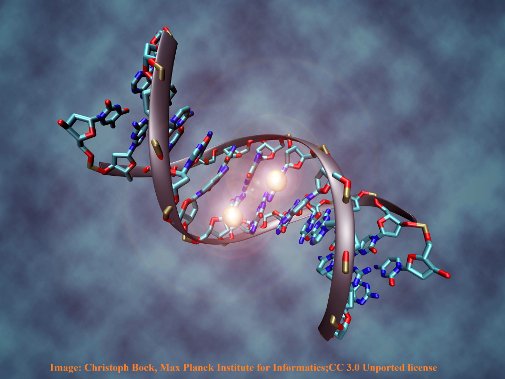
Picture of a DNA molecule, (a Visual Molecular Dynamics rendering program was used, and Photoshop) methylated on two strands.
It's Not That Simple
As time passes and research continues, it has become obvious that the simple parental conflict scenario does not present an accurate impression of genomic imprinting. Where once it was thought that this occurred in a couple of clusters on chromosomes 11 and 15, now it is known that it is also spread throughout the genome. The most recently discovered imprinted gene was found on chromosome 21. Imprinting can have subtle or profound effects.
Take, for example, H19, the growth gene at the center of parental conflict discussed earlier. We've established that the mother's H19 is expressed and the father's is not. But H19 is not the only growth gene. There's another gene, IGF2, which is very close to H19 on chromosome 11. This is also a growth gene. But it is silenced in the mother and expressed in the father.
H19 on Chromosome 11: Influences Fetal Growth
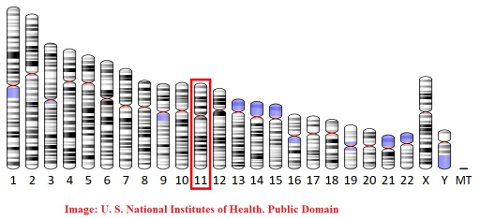
However, that's not the end of the story.
Let's say something happens to the mother's H19 and she does not have this growth gene to guide the fetus. It seems that the imprinting (silencing) of her nearby IGF2 growth gene will be "relaxed" to compensate (this information was derived from a mouse study, not a human study). If this sounds complicated, it is. And geneticists are just figuring out how the complex system of genomic imprinting works.
Not only are maternal and paternal genes imprinted, but the imprinted genes are programmed to be silent or active at different stages of life.
What Can Go Wrong?
Plenty
Diploid Insurance Policy
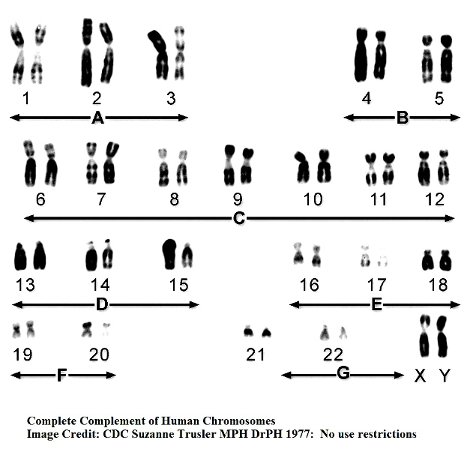
The normal human genome is diploid-- it has 46 chromosomes, 23 from the mother and 23 from the father. This pairing allows for a backup in case something happens to one of the genes in a pair. In that case, a gene on the corresponding, paired chromosome can compensate for the loss.
However, if one of the genes in a pair is imprinted, there is no backup, no insurance policy. Or, if somehow the imprinted gene is mislabeled or misread, then there can be negative consequences.
Some Consequences Related to Imprinting
Angelman Syndrome
This is a commonly cited example of an imprinting disorder. The gene responsible for this disorder is UBE3A, on chromosome 15. Apparently both maternal and paternal copies of this gene are active throughout the body--everywhere except the brain. In the brain, the father's gene is imprinted and only the mother's gene is active. But sometimes maternal UBE3A gets deleted, or damaged. The father's gene is imprinted (silenced) and cannot compensate, so a constellation of abnormalities result. These include movement disorders, seizures and developmental disorders.

This sixteenth-century picture, by Giovanni Francesco Caroto, was painted long before Angelman Syndrome was understood. But the child in the picture looks like some people who are diagnosed with Angelman syndrome. Harry Angelman (pediatrician after whom the disorder is named) actually used the picture to help describe clinical features of the syndrome. Children with Angelman syndrome often appear to be very happy.
Prader-Willi Syndrome
This is another commonly cited imprinting disorder related to chromosome 15. In this case, the affected area of the chromosome is active in the father and imprinted in the mother. If there is a deletion on the father's chromosome, the mother's corresponding chromosome cannot compensate. People with Prader Willi have stunted growth (sometimes treatable by growth hormone), insatiable appetites as they grow older, weak muscle tone and certain developmental or personality issues.
Cancer
Epigenetics--genomic imprinting--offers a promising area of cancer research. Two genes that have been the focus of research are the previously discussed H19 and IGF2. Since both genes affect growth, they have been implicated in the development of tumors. According to an article in Biometrical Central, these two genes have been studied especially in regard to colorectal cancers. The authors of the journal article suggest that looking at peculiarities in the methylation of these genes may help in diagnosing cancers and also in offering prognosis.
Assisted Reproductive Technologies (Artificial Insemination)
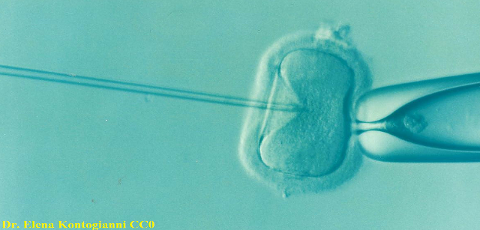
Picture shows human sperm being injected into a human egg.
Studies have shown that there is a higher incidence of imprinting errors in children who are the result of assisted reproductive technologies. Research seems to indicate that certain, imprinting related, "major malformations" occur more commonly in children who are born with this assistance.
Consider this blog an introduction. I have learned a great deal about inheritance and genetics from reading the research on genomic imprinting. Besides rethinking Freud's (ridiculous) theory about penis envy, I'm fascinated by the implications for the nature vs. nurture argument. I am left wondering, how far can the apple really fall from the tree? Epigenetics may provide part of that answer.


Credits/Sources
The picture at the start of the post was from Pixabay clipart. Other, not credited, accents in the piece (apple, for example) came from Paint 3D. I made the GIFs.

There are many more sources I read, for background, in order to become familiar with this topic.
Scitable "Discovery of DNA Structure and Function: Watson and Crick"
https://www.nature.com/scitable/topicpage/discovery-of-dna-structure-and-function-watson-397
The Psychologist "he genetic battle of the sexes"
https://thepsychologist.bps.org.uk/volume-29/october-2016/genetic-battle-sexes
Plos Genetics "The Importance of Imprinting in the Human Placenta"
https://journals.plos.org/plosgenetics/article?id=10.1371/journal.pgen.1001015
Journal of the American Psychoanalytic Association "Penis Envy: from childhood wish to developmental metaphor"
https://www.researchgate.net/publication/22351033_Penis_envy_from_childhood_wish_to_developmental_metaphor
Oxford Journal: Human Molecular Genetics "Genome-wide survey of parent-of-origin effects on DNA methylation identifies candidate imprinted loci in humans"
https://www.ncbi.nlm.nih.gov/pmc/articles/PMC6077796/
Cold Spring Harbor: Perspectives in Biology: Genomic Imprinting in Mammals
https://cshperspectives.cshlp.org/content/6/2/a018382.full
European Journal Human Genetics "A genome-wide search for new imprinted genes in the human placenta identifies DSCAM as the first imprinted gene on chromosome 2"
https://www.ncbi.nlm.nih.gov/pubmed/30206355
Proceedings of the National Academy of Science "Loss of the maternal H19 gene induces changes in Igf2 methylation in both cis and trans"
https://www.researchgate.net/publication/13927403_Loss_of_the_maternal_H19_gene_induces_changes_in_Igf2_methylation_in_both_cis_and_trans
Genetics Home Reference "Angelman syndrome"
https://ghr.nlm.nih.gov/condition/angelman-syndrome#genes
JAMA Pedtatrics "Angelman Syndrome and the Portrait of a Child with a Drawing by Giovanni F. Caroto (ca. 1480 - 1555)"
https://www.researchgate.net/publication/296020335_Angelman_Syndrome_and_the_Portrait_of_a_Child_with_a_Drawing_by_Giovanni_F_Caroto_ca_1480_-_1555
National Organization for Rare Diseases "Prader-Willi Syndrome"
https://rarediseases.org/rare-diseases/prader-willi-syndrome/
Nucleic Acids Research "Epigenetic instability of imprinted genes in human cancers"
https://www.ncbi.nlm.nih.gov/pmc/articles/PMC4678850/
BMC Clinical Epigenetics "Comprehensive methylation analysis of imprinting-associated differentially methylated regions in colorectal cancer"
https://clinicalepigeneticsjournal.biomedcentral.com/articles/10.1186/s13148-018-0578-9#Abs1
Pediatric International "DNA methylation errors in imprinting disorders and assisted reproductive technology"
https://www.researchgate.net/publication/255688140_DNA_methylation_errors_in_imprinting_disorders_and_assisted_reproductive_technology
Journal of Assisted Reproductive Technology "Comprehensive meta-analysis reveals association between multiple imprinting disorders and conception by assisted reproductive technology"https://www.ncbi.nlm.nih.gov/pubmed/29696471
Euroean Journal of Medical Genetics Assisted Reproductive Technologies and imprinting disorders: Results of a study from a French congenital malformations registry
https://www.ncbi.nlm.nih.gov/pubmed/29775803
Genetics Home Reference "What are genomic imprinting and uniparental disomy?"
https://ghr.nlm.nih.gov/primer/inheritance/updimprinting
Plant Physiology "Characterization of Imprinted Genes in Rice Reveals Conservation of Regulation and Imprinting with Other Plant Species"
http://www.plantphysiol.org/content/177/4/1754
Nature Reviews, Genetics "Genomic imprinting disorders: lessons on how genome, epigenome and environment interact"
https://www.nature.com/articles/s41576-018-0092-0
eLife "The discovery and importance of genomic imprinting"
https://www.ncbi.nlm.nih.gov/pmc/articles/PMC6197852/
Science Direct "Influences of genomic imprinting on brain function and behavior"
https://www.sciencedirect.com/science/article/pii/S2352154618301153
PLOS Genetics"The Importance of Imprinting in the Human Placenta"
https://journals.plos.org/plosgenetics/article?id=10.1371/journal.pgen.1001015
Learn.Genetics "Genomic Imprinting"
https://learn.genetics.utah.edu/content/epigenetics/imprinting/
Biology Pages Info "Imprinted Genes"
http://www.biology-pages.info/I/Imprinting.html
Journal of Cell Science "Paxillin-dependent regulation of IGF2 and H19 gene cluster expression "
http://jcs.biologists.org/content/128/16/3106
American Journal of Obstetric Gynecology "Alterations in expression of imprinted genes from the H19/IGF2 loci in a multigenerational model of intrauterine growth restriction (IUGR)"
https://www.ncbi.nlm.nih.gov/pubmed/26880735
NCBI Resources "H19 imprinted maternally expressed transcript [ Homo sapiens (human)]"
https://www.ncbi.nlm.nih.gov/gene/283120
This post has been voted on by the SteemSTEM curation team and voting trail in collaboration with @utopian-io and @curie.
If you appreciate the work we are doing then consider voting all three projects for witness by selecting stem.witness, utopian-io and curie!
For additional information please join us on the SteemSTEM discord and to get to know the rest of the community!
Thank you so much! I have voted for the three of you!
I don't remember when we had so many great posts in a single day. Thanks for contributing!
Thank you!
Agreed! :)
Ah, the long awaited Promised Post!
Well that's a spin on the 'paternity uncertainty principle' that I had neither thought of nor encountered before. From the title, I actually was expecting unborn babies of different sexes duking it out!
By parity of reasoning, boys should have boobie envy? We do seem to seek them out...
True! I quite like your idea and phrasing. Which means that I should like Freud's too! I don't think just calling it ridiculous will do. We should figure out a way to test it. Maybe it has been. People don't seem to like Freud anymore and most of his ideas seem to have been debunked, though I'm unsure about the specific one.
Interesting, readable, and well-researched post, and the Freud part was entertaining! 👍
I'm sure you could almost hear me "talking" to you as I wrote the piece about Freud. So glad you were entertained. I had great fun writing that.
I think you may find the craving for mammary glands is likely cultural and if it is not, is probably associated with a subliminal urge to nurse. I mean, those glands are the most primal source of nutrition, aren't they?
I do have fun with this.
Thank you for reading and commenting....I would have been disappointed if you hadn't :))
No! Permanent breasts. No other mammal. Negatively impact locomotion. They're enticing on purpose, whether their owner wants them to or not!
I enjoyed reading and commenting!
Thanks for the post, I'm really interested in all stuff about genes and epigenetic and defently learned something :).!
Posted using Partiko Android
Thanks! Me too. I think it has so many implications for social and health policy. Fun writing and researching this.
It is interesting you mention Angelman's syndrome. We have a racer in my institute racing to raise funds for AFSA (a Frnech organisation aiming to fund research on the syndrome).
Very nice piece of text by the way!
That's what we need, research. So many "orphan" diseases and syndromes I'd like to retire permanently.
Thanks for the compliment!
Not enough research funding to tackle everything that should be tackled, unfortunately :(
I always sucks at this science things but with your blog I think I finally grab something.
So all these processes goes on in the human body... Lol.
Humans are suffering then but as they say we can never live without them.
I enjoyed every second I spent on your blog. Keep it up
Posted using Partiko Android
That may be the best compliment I've received. I'm not a scientist. I work hard to understand the material and then I try to write it so just ordinary people, like me, can appreciate it. Very, very glad it meant something to you.
You are welcome. And yea you are giving in your best. Keep it up
Posted using Partiko Android
Hey @agmoore,
wonderful article again. And again so fruity & vivid. I really appreciate this.
--> resteem!!!
The topic you are talking about is indeed a huge problem I think. Numerous defects or health problems are related to problems which are hard to spot. In your case, someone would make a mere gene sequencing with the conclusion that everything should work. Only with further characterizations, the real problem could be found. In many cases, this wouldn't be the case. The consequence: A life in pain! In my company, we try to offer various approaches: gene sequencing, the reaction of the cells, metabolic tests, cytokine panels... Nevertheless, for many people, it is not affordable. We need a health system which promotes cutting-edge tools in a broad range. This, in turn, could reduce the costs for the public health system. Nonetheless, I expect it will take between 10 and 30 years until we achieve a full acceptance of these innovations. Until then: Good luck to everyone.
Regards,
Chapper
I am responding now and upvoting later (I'm a spendthrift--always out of VP), but I am so delighted with your response that I can't hold back. I have to admit that the science pieces of this were written partly with you as an imagined audience. It helps me to write when I image "real" people reading my material. So I'm very happy you felt engaged.
Yes, the potential for health remedies is great. I also am very interested in the social implications--the so-called influence of "environmental insults". The burden of social and economic deficits, on the young especially, perhaps can be more accurately quantified. And also the toll that pollution exacts. This might influence, for the better, discussions about social policy.
Thanks so much for stopping by. A real pleasure to read your comment. I did try to make the blog "fruity" :))
Oh, a new article from you! I will read it in the next days as for the recent days and today I exhausted all of my capability to turn in any more content.
Probably you do feel the same after all the work you have done here.
Greetings!
In time, or not at all. You know I love to write these posts. I learn so much.
Rest. Recharge those batteries. Your friends will always be here for you.
Greetings, indeed.
I wonder how Freud could ever rise to this terminology of penis envy. Such envy is more likely to be formulated by adults. (Young) children accept the differences between people without thinking, and envy can probably only develop if it is suggested to them. Nor is womb envy - amusement - a conclusive argument for any envy of women's ability to bear children. You are right :)
I opened some of the sources you offered but I still cannot make sense of the exploitation of those imprinted genes which cause the mother of the child to exhaust herself so she won't have any other children but those from the one man which was successful in this imprinting process. What does "exhausting" mean in this context? Is there any time frame involved? I really don't get it.
Sometimes language seems to come into the way and gets me biased or influenced how biologists explain what genes do in very much social terms.
Well, I think the geneticists are guessing. One day they may find this theory of parental conflict ridiculous. I don't know. But I do recall that when I carried both my children I had trouble with my teeth (cavities) and the dentist said this was common during pregnancy. So the fact that a child draws resources from the mother is actually quite feasible. How else does the fetus live, but from the mother's resources?
I love this comment:
I think so. We are taught to notice minor differences (and it is minor). As for envying the womb--I agree both penis envy and womb envy seem like absurd propositions to me, reserved for the pathologically inclined :))
So glad you appear to have recouped somewhat. Get strong. Be well. Have fun here. That's the important part.
:)
Oh, I can remember the same, of course the fetus uses the mother as a resource. I had bleeding gums all the time during pregnancy and aweful heartburn. But again I had a radiant soft skin, my hair was shiny and healthy like never before, etc.
It is not quite right in my eyes that the fetus exhausts the mother as far as the nutrition of the mother tries to balance the substances that are taken from her and carried into the placenta for nutritional value. That is why I think that the typical appetite for other foods than what one usually knows from oneself comes. So I ate lamb with great preference during my pregnancy, but have never touched it again since then, because I cannot stand the taste.
But it tasted great at that time and I had a lot of pleasure with it. I don't think much of such one-sided cause-effects, most of the time it is much more complex.
Nevertheless it's interesting to read your article, but I thought it had something completely different to do with the fact that this imprinting of the father's genes was something else. ... Anyway, thank you for the memories of the pregnancy. ... Oh... were there differences in food preferences as you have a boy and a girl?
When I wrote this, I was actually more interested in the role environment has on inheritance and development. I think that is a pressing concern, something we can affect through policy. Genomic imprinting (epigenetics) offers a great opportunity to separate genetic destiny from external influences. This blog would have been far too long if I explored that, but this is where I am going. This has implications not only for social policy but also for health--all kinds of diseases (metabolic, psychological, cancers) have been associated with mistakes in methylation. Anyway, the battle of the sexes was just a hook :)
During my pregnancies I was hungry all the time. I ate well but wisely. Carried fruit around with me to stave off cravings. I was quite an omnivore :)
I think that your description of diet during pregnancy makes a good point: we don't have scarcity of food resources. We don't have to worry about rationing because we have abundance. Maybe this system of limiting the growth of the fetus evolved in a time of scarcer resources, when we were hunter gatherers and food supply was not certain. Just a thought....
I see you have a post! Look forward to reading it!
In Freud's defense, it does seem like a universal truth that people want more. When our neighbor has more stuff, we envy him. We hoard stuff, even when we don't use them.
A second apparently universal principle is that humans are very visual creatures. It's probably our most important sense, both subjectively and perhaps objectively.
Putting these two together, the idea of penis envy becomes 'intuitively appealing', because visually we can't see what's inside, the dangling thing is more attention-grabbing, and people just tend to want more of everything.
Perhaps, also, if girls notice a difference in treatment from that age, favoring boys, and the only difference they can observe visually at that prepubescent age is the penis, then they might attribute said differential treatment to the penis, and therefore begin to envy it. 🤷♂️
Hmm.. doesn't convince me. Even if you would have rock solid empirical evidence, women still would not admit that they envy penises. Why should they, after all? There is nothing to gain from. Nothing which is inspirational or bringing anyone forward in his maturation or having the feeling of accomplishing an important thing.
The fact that you drag around such envy from childhood all your life without knowing about it and then justify the adult negative reactions of women towards men with such a penis envy leads to completely fruitless, hostile, emotionally charged debates, where in the end you have learned nothing really interesting. It's just the wrong focus if you ask me. After all, the associations women do have on the word "Penis" as adults is really something you should take into account (to accept penis envy and then let it into me during sexual intercourse seems somewhat crooked).
And you're talking to the wrong person about envy. I am so not jealous at all of the "more" of the others. On the contrary, I think that so many material things are quite a burden. I want to free myself from them and live as easily as someone who just ties up his sack and sets off on the journey with it. ... It will take a while until then, but maybe one day I will make it ;-)
Freud has been so discredited. What saddens me is all the women who were "treated" over the years by psychologists who believed this envy was the root of their anxiety.
I want to give credit to him for his "finding" of the subconscious - THIS is actually the more interesting thing. Which of course, was long found by others but he deserves the credit for the Western modern world.
Yes, many atrocities were done on people in the name of whatever was the state of the arts. I remember this poor Kennedy daughter which had to endure the brain seizure and was afterwards crippled. Was not because of hysteria but ...you know, in the end those cases bare many similarities.
Of course he changed the way we look at ourselves, and that was revolutionary. But revisions were definitely in order :)
@alexander.alexis: Sorry---but girls are more likely to be concerned about the fragility of the external, conspicuously vulnerable appendage, if they notice it at all.
I do remember as a child that I resented my Sicilian mother's insistence that my brother take precedence over me in some circumstances. He was three years older so certain privileges were attached to age. But others, clearly described, were not. These seemed so unreasonable to me (you can see the personality forming) that I would just remove myself from the situation. (ex: your brother sits at the head of the table). My father was absent so my brother became "the man of the house". Oh, did that gall me. It may be why I give you so much trouble here :))
😃